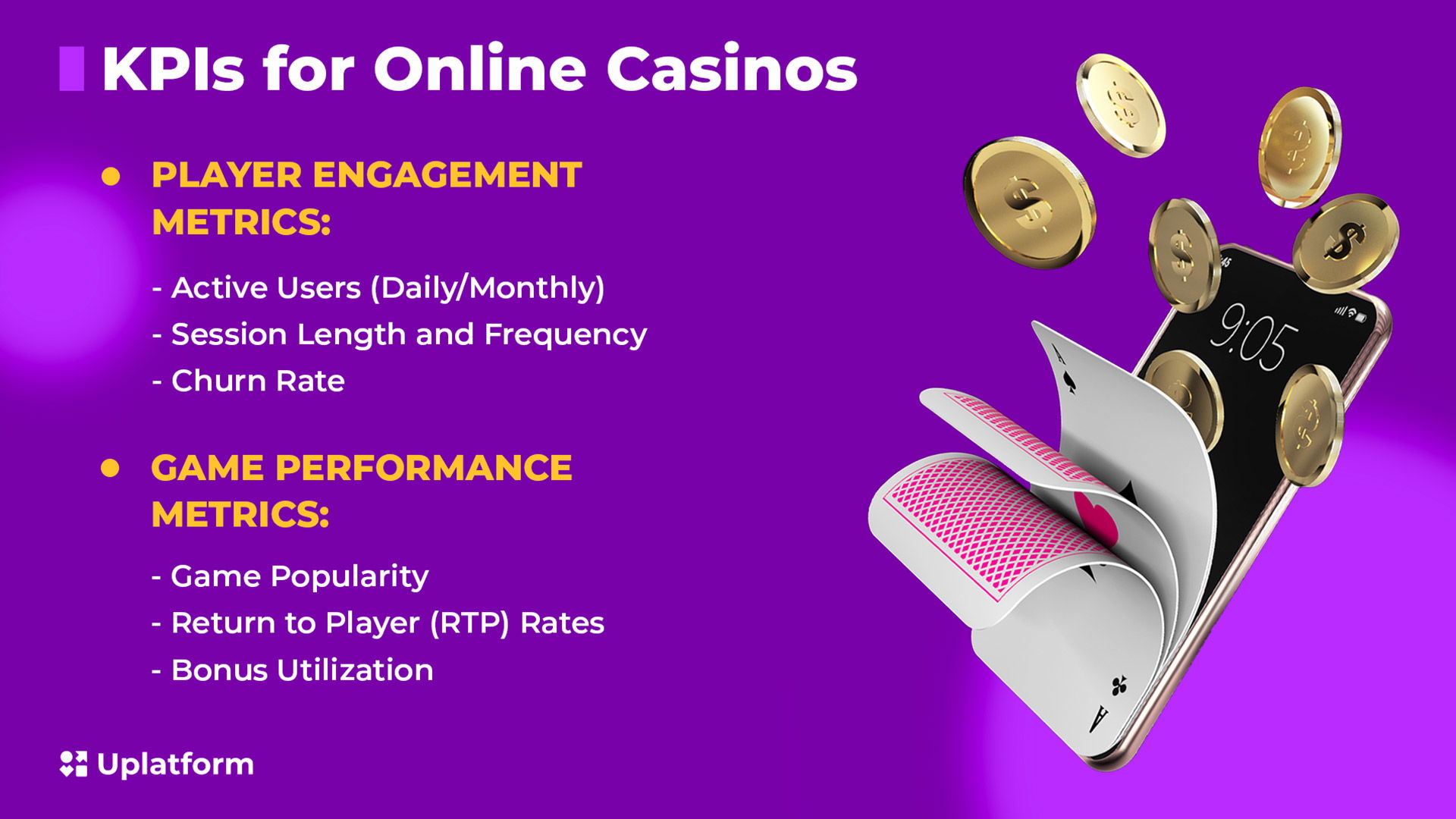Unlock data's power: The smart operator’s guide

In its latest analysis, online gaming software supplier Uplatform explores the importance of data analytics and its impact on iGaming businesses.
In the fast-paced world of iGaming, data is no longer just a tool—it’s the lifeblood of successful decision-making. From player acquisition to marketing, and adding new features, iGaming development, and retention strategies, leveraging analytics enables operators to make smarter, more informed choices. Let’s explore how data analytics empowers iGaming businesses to fine-tune their strategies, with a focus on practical insights that drive competitive advantage.
The role of data in iGaming
Data has become the cornerstone of competitive advantage in the ever-evolving iGaming industry. It enables operators to decode player behavior and market trends in real-time, offering actionable insights to create personalized experiences that enhance player engagement and loyalty.
For iGaming operators, success is closely tied to how well they interpret and adapt to players' preferences. This demands a proactive approach to data accumulation and analysis, coupled with the agility to evolve as player behaviors shift. Detailed insights—such as player profiles, preferences, deposit tendencies, and withdrawal patterns—empower operators to optimize their offerings and ensure sustained engagement.
Beyond player acquisition and retention, data plays a pivotal role in shaping marketing campaigns, determining which games resonate with target audiences, identifying optimal payment methods, and evaluating potential markets for expansion. For instance, understanding which games attract the most engagement in a particular region or analyzing payment preferences to reduce transaction friction allows operators to refine their strategies. This detailed understanding enables operators to make informed decisions on everything from game portfolios to promotional timing and content.
Researching local markets and analyzing data on device preferences, peak activity hours, and favored features further help operators develop targeted and effective marketing strategies. For example, recognizing that players in a specific region prefer mobile gaming during evening hours can guide the timing of promotions and game releases. By choosing a strong platform provider like Uplatform—which offers CRM and Back Office tools alongside deep expertise in popular markets and valuable market insights—operators can remain agile and responsive, staying ahead in a highly competitive industry.
Data-driven player acquisition
In the highly competitive iGaming industry, acquiring players with the highest potential lifetime value (LTV) is crucial for an operator’s success. The key to identifying these high-value individuals lies in the strategic use of data analytics. By analyzing player behaviors—such as preferences, spending habits, and interactions—operators can acquire and identify those most likely to become loyal, long-term participants.
The data-driven acquisition involves more than just bringing players to your site—it’s about attracting the right players. With the help of advanced analytics tools, operators can segment their target audience based on factors like geographical location, device usage, and preferred iGaming categories. This segmentation enables operators to craft tailored marketing campaigns, personalized bonuses, and other incentives that resonate with these high-value players.
For example, analyzing data on players who frequently bet on Esports tournaments can help create personalized campaigns targeting major events like the League of Legends World Championship or The International Dota 2 Tournament. By offering exclusive promotions around these high-stakes events, operators can drive increased engagement and excitement. Additionally, understanding which acquisition channels attract the most dedicated Esports bettors allows operators to focus their resources on retaining these high-value players, ensuring long-term loyalty.
As Maria Bashkevich, Head of Marketing at Uplatform, explains, "There are countless strategies for both player acquisition and retention, but what operators truly need are strong marketing teams and solid data. Having robust CRM statistics is vital, and being able to set customized scenarios and triggers within a CJM (Customer Journey Map) is essential too."

Uplatform’s powerful CRM tool elevates acquisition by offering over 200 filters for precise client segmentation and in-depth reports that deliver valuable insights on new player activities—tracking registrations, deposits, and bets seamlessly. Additionally, it includes other impressive features that boost engagement and retention, ensuring your overall marketing strategy is fully optimized for sustained growth.
Enhancing player retention through analytics
While acquiring new players is critical, the key to sustained profitability lies in retaining and deeply engaging them over time. Data analytics plays a crucial role in helping operators build personalized retention strategies that keep players engaged and loyal over time. By closely tracking player activities—such as session frequency, deposit patterns, and engagement with promotions—operators can identify trends and proactively address churn risks.
As Ksenia, TL Casino & Affiliates at Uplatform, highlights, "At Uplatform, we recognize the importance of tailored retention strategies. Our comprehensive solution includes tools for targeted communication, detailed analytics, and expert guidance to help operators maximize player retention, boost profitability, and drive sustainable growth."
One key retention strategy is personalized communication. By using analytics to understand what types of offers and incentives resonate with different player segments, operators can send targeted messages that encourage continued play. For example, a player who enjoys specific slots can receive offers for new releases or promotions related to that category. Additionally, time-sensitive offers, such as bonuses available only for a limited time, can be highly effective in encouraging immediate engagement.
Dina, Head of B2B Projects at Uplatform, emphasizes the need for a proactive approach: "Don’t assume that a hesitant user will stay on the site for long or that they will eventually complete registration or engage in deposit activity on their own. Let the user know that the offer might be time-limited and that the greatest benefit for them is available today and right now."

By combining predictive analytics with real-time data, operators can anticipate player needs and deliver timely, relevant offers that boost engagement and foster long-term loyalty. This data-driven approach ensures that each interaction feels personalized and enhances the overall player experience, ultimately leading to greater retention and profitability.
Key Performance Indicators (KPIs) in online casinos and sportsbooks
To make informed decisions, iGaming operators must consistently monitor key performance indicators (KPIs) that deliver actionable insights into various aspects of their business. These KPIs not only serve as benchmarks for success but also guide strategic adjustments and operational improvements. To achieve a comprehensive understanding of performance, it is essential to track both general metrics that provide a broad overview and more specific ones that offer deeper analytical insights.
Below are some of the key general metrics every iGaming operator should monitor:
- Gross Gaming Revenue (GGR): Reflects the total revenue generated from gaming activities before deducting expenses such as bonuses, promotions, and taxes. A higher GGR indicates healthy game performance and engagement.
- Net Gaming Revenue (NGR): Measures the revenue after all associated costs are deducted, giving a clear picture of actual profitability.
- Average Revenue Per User (ARPU): Tracks the revenue earned per player over a specific period, providing insight into how effectively operators are monetizing players.
- Registration to Deposit Conversion Rate: Indicates the percentage of new sign-ups that result in deposits, showing the effectiveness of the onboarding process and promotional offers.
- Deposit to Bet Conversion Rate: Highlights how effectively the business converts deposits into betting activity, providing a window into player engagement post-deposit.
In addition to these general metrics, operators should also consider tracking more specific indicators to dive deeper into their analytics. These include metrics such as player lifetime value (LTV), churn rate, bonus conversion rate, and cost per acquisition (CPA).
KPIs for online casinos

Player engagement metrics:
- Active Users (Daily/Monthly): Monitoring daily and monthly active users helps operators understand the engagement level and consistency of player activity.
- Session Length and Frequency: By analyzing how long and how often players engage, operators can gauge the stickiness of their offerings and adjust content or promotions to encourage longer playtime.
- Churn Rate: The percentage of players who stop using the site over time. A high churn rate indicates that retention strategies may require immediate attention and refinement.
Game performance metrics:
- Game Popularity: Understanding which games perform best among certain player segments helps operators strategize their offerings and promotions.
- Return to Player (RTP) Rates: Analyzing RTP rates helps ensure games offer enough value to players while maintaining profitability for operators.
- Bonus Utilization: Measures how effectively players are using bonuses and rewards, offering insights into promotional success and player satisfaction.
KPIs for sportsbooks

Betting activity metrics:
- Number of Bets Placed: Indicates overall betting engagement and whether specific sports or events are resonating with the audience.
- Average Bet Size: Reflects player risk tolerance and helps optimize odds and promotions for high-value bettors.
- Live Betting vs. Pre-Match Betting Ratios: Provides insight into player preferences, helping tailor offerings to cater more effectively to live betting enthusiasts.
Margin and hold metrics:
- Gross Margin: The difference between bets placed and payouts, showing the operation’s profitability.
- Hold Percentage: Reflects how much of the betting volume the operator retains after payouts, an important measure for long-term financial stability.
Player behavior metrics:
- Bet Frequency: Tracks how often players place bets, helping operators understand engagement levels and predict betting patterns.
- Favorite Sports/Leagues: Understanding the most popular sports and leagues allows operators to tailor offerings, create targeted promotions, and ensure the sportsbook stays relevant to its audience.
- In-play Engagement: This metric focuses on live betting activity, providing insight into which live events capture player attention and how operators can leverage this in real-time marketing efforts.
Acquisition and retention metrics:
- First-Time Depositors: A key metric for evaluating the success of acquisition campaigns and onboarding processes.
- Retention Rate: Measures the ability to keep players returning to the site, highlighting the effectiveness of retention strategies.
- Cross-Selling Rates: Tracks how successfully players are being moved between verticals (e.g., sportsbook to casino), which can inform promotional strategies and product bundling efforts.
Future trends in iGaming analytics
As the iGaming industry becomes increasingly data-driven, the role of analytics is evolving to provide more personalized and efficient experiences for both operators and players. As technology advances, new trends are emerging that will reshape how data is used in the industry. Understanding these trends is essential for operators looking to stay ahead in an ever-competitive market. Here are some of the key developments that will shape the future of iGaming analytics:
- Artificial Intelligence (AI) and Machine Learning (ML): AI and ML will play a larger role in automating data analysis and personalizing player experiences. By predicting player behavior and preferences, these technologies can help operators offer tailored content, bonuses, and even recommendations, improving engagement and retention.
- Real-Time Analytics: The growing demand for real-time analytics will enable operators to make instant decisions based on live data, optimizing in-game promotions, adjusting odds, and improving service. This will allow operators to react quickly to player behavior and maximize revenue opportunities during live events.
- Predictive Analytics: Leveraging predictive models, operators can forecast player activity and trends, enabling more proactive decision-making. Predictive analytics will help operators not only anticipate player needs but also mitigate potential risks, such as detecting problem gambling behaviors early.
- Data Privacy and Security: As operators increasingly rely on data analytics to understand player behavior and improve experiences, protecting that data becomes crucial. Ensuring compliance with data protection laws, like GDPR, while securing player information, helps build trust. A strong data security infrastructure not only safeguards sensitive information but also supports the effective use of analytics to personalize services, enhancing player satisfaction and boosting retention.
- Fraud Prevention: One critical challenge in iGaming is combating fraud, particularly bonus abuse. Fraudulent activities, such as creating multiple accounts or exploiting marketing offers, can lead to significant revenue losses. By integrating advanced analytics and machine learning models, operators can enhance fraud detection, identify suspicious patterns, and strengthen identity verification processes, ensuring a fair and secure environment.
Data is an invaluable asset for iGaming operators, informing smarter decisions at every stage—from player acquisition to retention, marketing, development, and fraud prevention. By tracking the right KPIs and leveraging advanced analytics, operators can unlock insights that drive competitive advantage, enhance overall business performance, and mitigate risks such as fraud. As technology continues to evolve, the role of data in iGaming will only grow, offering even more opportunities for personalized experiences, optimized strategies, and long-term growth. Importantly, this entire analytics process is ongoing—it is not a one-time task, but a continuous effort to adapt and improve in an ever-changing landscape.

















































